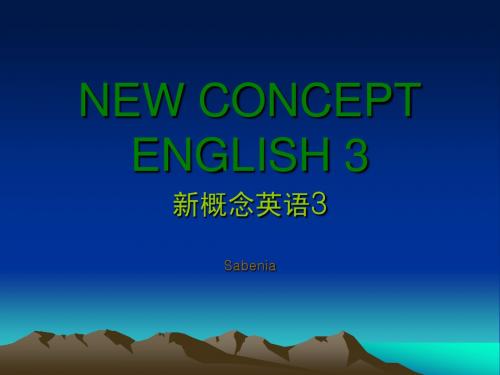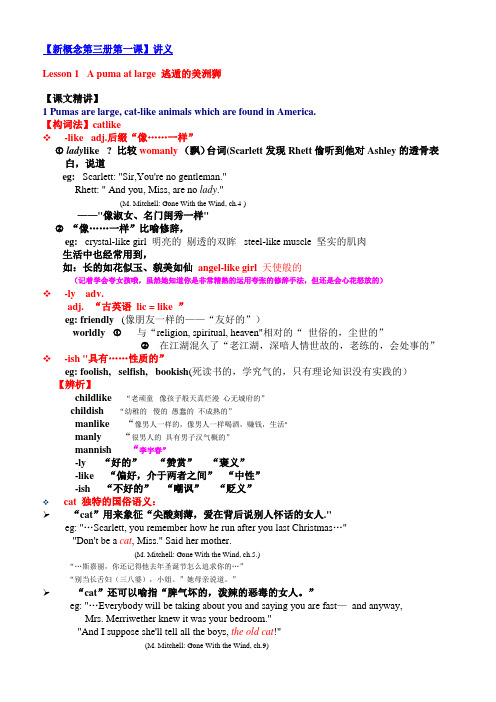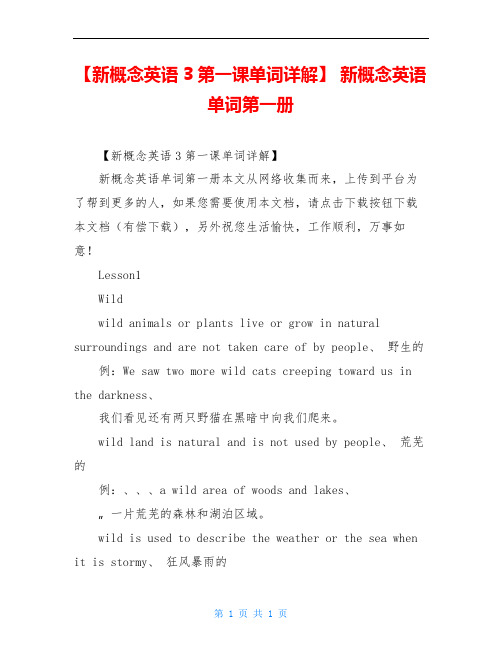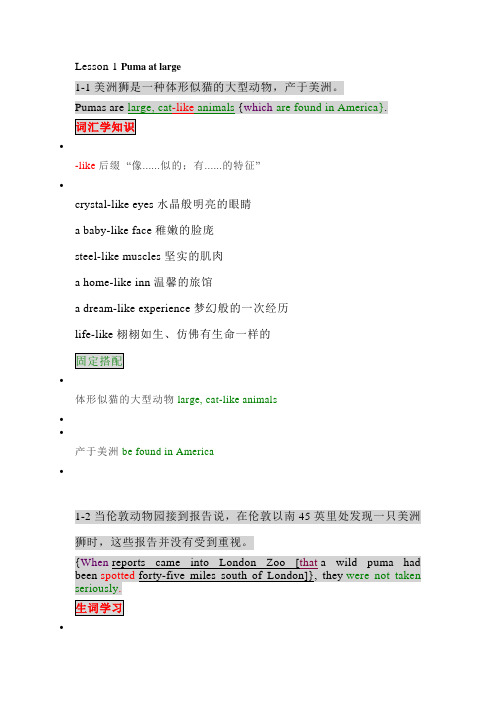新概念英语3第一课单词详解
- 格式:docx
- 大小:20.60 KB
- 文档页数:6




【新概念第三册第一课】讲义Lesson 1 A puma at large 逃遁的美洲狮【课文精讲】1 Pumas are large, cat-like animals which are found in America.【构词法】catlike❖-like adj.后缀“像……一样”①lady like ? 比较womanly (飘)台词(Scarlett发现Rhett偷听到他对Ashley的透骨表白,说道eg: Scarlett: "Sir,You're no gentleman."Rhett: " And you, Miss, are no lady."(M. Mitchell: Gone With the Wind, ch.4 )——"像淑女、名门闺秀一样"②“像……一样”比喻修辞,eg: crystal-like girl 明亮的剔透的双眸steel-like muscle 坚实的肌肉生活中也经常用到,如:长的如花似玉、貌美如仙angel-like girl 天使般的(记着学会夸女孩哦,虽然她知道你是非常精熟的运用夸张的修辞手法,但还是会心花怒放的)❖-ly adv.adj. “古英语lic = like ”eg: friendly (像朋友一样的——“友好的”)worldly ①与“religion, spiritual, heaven"相对的“世俗的,尘世的”②在江湖混久了“老江湖,深喑人情世故的,老练的,会处事的”❖-ish "具有……性质的”eg: foolish, selfish, bookish(死读书的,学究气的,只有理论知识没有实践的)【辨析】childlike “老顽童像孩子般天真烂漫心无城府的”childish“幼稚的傻的愚蠢的不成熟的”manlike “像男人一样的,像男人一样喝酒,赚钱,生活"manly “很男人的具有男子汉气概的”mannish “李宇春”-ly “好的”“赞赏”“褒义”-like “偏好,介于两者之间”“中性”-ish “不好的”“嘲讽”“贬义”❖cat 独特的国俗语义:➢“cat”用来象征“尖酸刻薄,爱在背后说别人怀话的女人."eg: "…Scarlett, you remember how he run after you last Christmas…""Don't be a cat, Miss." Said her mother.(M. Mitchell: Gone With the Wind, ch.5.)“…斯嘉丽,你还记得他去年圣诞节怎么追求你的…”“别当长舌妇(三八婆),小姐。

【新概念英语3第一课单词详解】新概念英语单词第一册【新概念英语3第一课单词详解】新概念英语单词第一册本文从网络收集而来,上传到平台为了帮到更多的人,如果您需要使用本文档,请点击下载按钮下载本文档(有偿下载),另外祝您生活愉快,工作顺利,万事如意!Lesson1Wildwild animals or plants live or grow in natural surroundings and are not taken care of by people、野生的例:We saw two more wild cats creeping toward us in the darkness、我们看见还有两只野猫在黑暗中向我们爬来。
wild land is natural and is not used by people、荒芜的例:、、、a wild area of woods and lakes、…一片荒芜的森林和湖泊区域。
wild is used to describe the weather or the sea when it is stormy、狂风暴雨的例:The wild weather did not deter some people from taking an unseasonable dip in the sea、狂风暴雨的天气并没有使一些不合时宜地到海里游泳的人却步。
Wild behaviour is uncontrolled, excited, or energetic、狂热的例:The children are wild with joy、孩子们欣喜若狂、If you describe someone or their behaviour as wild, you mean that they behave in a very uncontrolled way、疯狂的例:The house is in a mess after a wild party、一次疯狂的聚会之后,房子里一片狼藉。

•-like 后缀“像......似的;有......的特征”••体形似猫的大型动物large, cat-like animals••产于美洲be found in America••spot v.to see or notice sth. that is difficult to see or find看出, 发现(尤其是不太容易被看到的对象)(强调结果,故而不用于进行时)•I spot someone coming out of the building.A tall man is easy to spot in the crowd. 个子高的人很容易在人群中认出来。
He has good eye for spotting mistakes. 他很善于发现问题。
I can't spot the difference between them. 我看不出两者的区别。
补充:同义辨析see: 最常用find:强调发现的结果find out:查出事实真相discover:做出重大发现notice:注意到observe:观察(书面语)watch:观察活动中的人或画面spot 发现一些不容易看到,正在寻找的东西补充:其他用法spot n. 现场;斑点The leopard cannot change his spots. 江山易移本性难移。
短语学习•take sth. seriously = deal with sth. seriously 认真地对待某事••“伦敦动物园接到报告”翻译成reports came into London Zoo,体现英语喜欢用非灵主语的特点。
•如:I suddenly had a great idea= A great idea suddenly came to/occurto/hit/strike me.The thought suddenly came to me that I had forgotten to take my wallet.When did the case come into the public eye? 公众是合适开始关注这个案子?How had this picture come into the possession of the press? 这张照片是怎么落到媒体手中的?另外,本句有同位语从句分隔的语法现象。
Lesson 01 A Puma at large 逃遁的美洲狮1. New Words and Expressions⑴puma= mountain lion (AE)n. 美洲狮【A puma is a wild animal that is a member of the cat family. Pumas have brownish-grey fur and live in mountain regions of North and South America.】⑵spot v. 看出、发现(强调结果)n. 斑点、地点【If you spot something or someone, you notice them.】→A tall man is easy to spot in the crowd.→I have just spotted a mistake in your essay.【Spots are small, round, colored areas on a surface.】→Which has spots, the leopard or the tiger?【A particular place】→The Great Wall is a hot tourist spot.on the spot【If you do something on the spot, you do it immediately.】→Anyone breaking the rules will be asked to leave on the spot. 【If you are on the spot, you are at the actual place where something is happening. 】⑶evidence=proof n.证据【Evidence is anything that you see, experience, read, or are told that causes you to believe that something is true or has really happened.】→When the police arrived, he had already destroyed the evidence.→There wasn’t enough evidence to prove his guilt.in evidence 显而易见的【If someone or something is in evidence, they are present and can be clearly seen.】→Poverty and bad housing conditions are still very much in evidence.⑷accumulate v.积累(强调积累的过程)【When you accumulate things or when they accumulate, they collect or are gathered over a period of time.】Lead can accumulate in the body until toxic levels are reached. gather vt.聚集, 把某人聚集在某处→The teacher gathered his students in the class.collect vt.搜集→Do you collect stamps?assemble v.集会→A large number of people assemble on the square.hoard vt.大量的储存→The squirrel hoards up nuts for the cold winter.amass vt.积聚(主要用于诗歌和文学作品)→The clouds amassed above the hills⑸oblige v.使…感到必须→I feel obliged to say no to his demand.→Each citizen feels obliged to take care of the old and bring up the young.→They were obliged to sell their car s to pay their debts off.⑹hunt v. 追猎、寻找【When people or animals hunt, they chase and kill wild animals for food or as a sport.】→A leopard hunts alone.【If you hunt for something or someone, you try to find them by searching carefully or thoroughly.】→Some new arrivals lose hope even before they start hunting for a job.⑺corner v. 使走投无路、使陷入困境【If you corner a person or animal, you force them into a place they cannot escape from.】→He was still sitting huddled like a cornered animal.→The thief was cornered at last.⑻trail n. 一串, 一系列【A trail is a series of marks or other signs of movement or other activities left by someone or something.】→He left a trail of clues at the scene of his crimes.【If you trail someone or something, you follow them secretly, often by finding the marks or signs that they have left.】→Two detectives were trailing him.⑼print n. 印痕【You can refer to a mark left by someone's foot as a print .】【You can refer to invisible marks left by someone's fingers as their prints.】→Fresh prints of both girls were found in the flat.⑽cling v. 粘【If someone clings to a person they are fond of, they do not allow that person to be free or independent.】→I was terrified he would leave me, so I was clinging to him. →He clung to the hope that he would succeed.⑾convince v. 使…信服【If someone or something convinces you of something, they make you believe that it is true or that it exists.】→I convince him of my honesty.→I am convinced that she is an honest girl.⑿disturb v. 令人不安【If something disturbs you, it makes you feel upset or worried.】→He had been disturbed by the news of the attack.【If you disturb someone, you interrupt what they are doing and upset them.】→I hope I'm not disturbing you.2. Notes on the Text⑴Pumas are large, cat-like animals which are found in America.→crystal-like eyes/angel-like girl/home-like hotel★be found in:产于,表现了动物飘忽不定的特点→Giant pandas are large, bear-like animals which are found mainly in Sichuan province, China.⑵When reports came into London zoo…★came into这里运用了拟人修辞法,本句的重点是reports,按照英文行文规律,重要信息一般前置。
Lesson 1 A puma at largeAt large未被捕的;自由的,不受约束的;逍遥法外的The murd erer is still at large.The escaped prisoner is still at large.at large为介词短语,英语介词短语可以修饰之前的名词, 一般放在名词之后a puma at largeThe woman in red is his mother.A businessman on a fishing trip saw the puma up a tree.Where must the puma have come from?用情态动词must表示猜测的表达must be 表示对现在或者现在正在发生的事情的猜测。
You must be tired. You must be Tom.must have been 表示对过去某时发生的事情的猜测。
-Why didn’t you answer my phone?-Well, I must have fall asleep at the time.(1) Pumas are large, cat-like animals which are found in American.cat-like 猫一样的, 偷偷摸摸的/ d og-like 狗一样的/ life-like 栩栩如生的(2)When reports came into London Zoo that a wild puma had been spotted forty-five miles of London, they were not take seriously.这是一个that引导的同位语从句。
The fact that she works hard is well known to us all.Word came that Napol eon woul d come to inspect the armyDespite the fact that we have met many difficulties, we will not give up.Spot v. 看到,发现/ n. 斑点A tall man is easy to be spotted in the crowd.take sth seriously 认真对待某事He tol d me that there woul d be a heavy rain tonight, but I didn’t take it seriously.As a result, I was caught in the rain.Nearly everyone warned him of the danger, but he did’t taken it seriously.(3) However, as the evidence began to accumulate, experts from the Zoo felt obliged to investigate, for the descriptions given by people who claimed to have seen the puma were extraordinarily similar.However/as/forHowever 并列连词,表示句意上的转折as 引导时间状语从句,表示“随着----”for 引导原因状语从句,表示原因。
L11.puma: a wild animal that is a member of the cat family.①2.spot: to notice someone or something, especially when they are difficult to see or recognize~ sb / sth: I spotted him in the crowd②a particular place or area, especially a pleasant place where you spend timea nice quiet spot; a beauty spot③a small mark on something, especially one that is made by a liquidThere was a big dirty spot on the wall.3.evidence: facts or signs that show clearly that something exists or is true证据;根据;证明evidence of: At present we have no evidence of life on other planetsevidence for: There is no evidence for these claims clear / strong / good evidence4.accumulate: collect, gather together → accumulationsth ~: Snow accumulated on the ground地上积了一层雪~ sth: He ~d a fortune by hard work.他靠努力工作积蓄了一笔财富5.oblige: ①to force sb to do sth, by law, because it is a duty, etc~ sb to do sth: Poverty obliged her to live a hard life. 贫困迫使她过艰苦的生活。
【导语】在全世界英语学习者的⼼⽬中,《新概念英语》可谓是⼀部“宝典”级的教材。
如今在中国,学习《新概念英语》也已蔚然成风。
以下是整理的新概念英语第三册Lesson1⼀4⽣词和短语,欢迎阅读!1.新概念英语第三册Lesson1⽣词和短语 puma(title)/'pju:m+/n. 美洲狮 corner(1. 9)/'k&:n+/v. 使⾛投⽆路,使陷⼊困境 spot(1. 2)/sp&t/v. 看出,发现 trail(1. 11)/'treil/n. ⼀串,⼀系列 evidence(1. 4)/'evid+ns/n.证据 print(1. 12)/print/n. 印痕 accumulate(1. 4)/e'kju:mjuleit/v. 积累,积聚 cling(1. 12)/kliR/(clung/kl)R/, clung)v. 粘 oblige(1. 5)/+'blaid{/v. 使……感到必须 convince(1. 14)/k+n'vins/v. 使……信服 hunt(1. 7)/h)nt/n. 追猎;寻找 somehow(1. 16)/'s)mha(/adv. 不知怎么搞地,不 blackberry(1. 8)/'bl$kb+ri/n. ⿊莓知什么原因 human being(1. 9)/?hju:m+n-'bi:iR/⼈类 disturb(1. 17)/di'st*:b/v. 令⼈不安2.新概念英语第三册Lesson2⽣词和短语 equal v.等于 vicar n.牧师 raise v.募集,筹(款) torchlight n.电筒光3.新概念英语第三册Lesson3⽣词和短语 New words and expressions ⽣词与短语 goddess(title) /'gɔdis/ n.⼥神 sacred(1. 10)/'seikrid/ adj.宗教的,神圣的 archaeologist(1. 1) /'a:ki'ɔldʒist/ n.考古学家 fragment(1. 10) /'frægmənt/n.碎⽚ Aegean(1. 2) /i:'dʒi:ən/ adj.爱琴海的 remains(1. 12)/ri'menz/ n.遗物,遗迹,废墟 explore(1. 2) /ik'splɔ:/ v.考察,勘探 classical(1. 13)/'klæsikəl/ adj.(希腊和罗马)古⽂化的 promontory(1. 3) /'prɔməntəri/ n.海⾓ prosperous(1. 4) /'prɔspərəs/ adj.(经济上)繁荣 reconstruct(1. 14) /'ruikn'strkt/ v.修复的,昌盛的 rest(1. 16)/rest/ v.倚放,放置 civilization(1. 5) /'sivəl-ai'zeiʃən/ n.⽂明 storey(1. 5) /'stɔ:ri/ n.楼层 full-length(1. 16) /'ful'leŋθ/adj.(裙⾐)拖地长的 drainage(1. 7)/'dreinidʒ/ n.排⽔ graceful(1. 17) /'greisfəl/ adj.优雅的 worship(1. 9) /'wə:ʃip/ n.祟拜 identity(1. 17) /ai'dentiti/ n.⾝份4.新概念英语第三册Lesson4⽣词和短语 manual adj. 体⼒的 collar n. ⾐领 sacrifice v. 牺牲,献出 privilege n. 好处 dustman n. 清洁⼯ corporation n. 公司 overalls n. ⼯作服 shower n. 淋浴 secret n. 秘密 status n. 地位。
Lesson 1Wild1.adj. wild animals or plants live or grow in natural surroundings and are not taken care of by people. (动物或植物) 野生的例:We saw two more wild cats creeping toward us in the darkness.我们看见还有两只野猫在黑暗中向我们爬来。
2.adj. wild land is natural and is not used by people. 荒芜的例:...a wild area of woods and lakes.…一片荒芜的森林和湖泊区域。
3.adj. wild is used to describe the weather or the sea when it is stormy. (天气或海面) 狂风暴雨的例:The wild weather did not deter some people from taking an unseasonable dip in the sea.狂风暴雨的天气并没有使一些不合时宜地到海里游泳的人却步。
4.adj. Wild behaviour is uncontrolled, excited, or energetic. (行为) 狂热的例:The children are wild with joy.孩子们欣喜若狂.5.adj. If you describe someone or their behaviour as wild, you mean that they behave in a very uncontrolled way. (指人或其行为) 疯狂的例:The house is in a mess after a wild party.一次疯狂的聚会之后,房子里一片狼藉。
6.adj. A wild idea is unusual or extreme. A wild guess is one that you make without much thought. 不寻常的(想法); 胡乱的(猜测)例:Browning's prediction is no better than a wild guess.布朗宁的预言只不过是胡乱猜测而已。
7.n. The wilds of a place are the natural areas that are far away from cities and towns. 荒野例:They went canoeing in the wilds of Canada.他们在加拿大的荒野地区划独木舟。
8.adv. 狂热地wildly例:As she finished each song, the crowd clapped wildly.她每唱完一首歌,人群就狂热地鼓起掌来。
9.adv. 疯狂地wildly例:Five people were injured as Reynolds slashed out wildly with a kitchen knife.五个人因雷诺兹拿着菜刀疯狂乱砍而受伤。
10.adv. 不寻常地; 胡乱地wildly例:"Thirteen?" he guessed wildly.“十三?”他胡乱猜道。
11.phrase Animals that live in the wild live in a free and natural state and are not taken care of by people. 处于野生状态例:Fewer than a thousand giant pandas still live in the wild.不到1000只的大熊猫还处于野生状态。
Spot1.N-COUNT Spots are small, round, coloured areas on a surface. 斑点例:The leaves have yellow areas on the top and underneath are powdery orange spots.叶子上端有黄色斑块,下方有粉状橙色斑点。
2.N-COUNT Spots on a person's skin are small lumps or marks. (皮肤上的) 小疙瘩; 斑例:My brother's face was covered with spots.我弟弟曾满脸疙瘩。
3.N-COUNT You can refer to a particular place as a spot. 地点例:They stayed at several of the island's top tourist spots.他们在岛上几个最好的旅游景点呆过。
4.N-COUNT A spot in a television or radio show is a part of it that is regularly reserved for a particular performer or type of entertainment. 固定节目档例:Unsuccessful at screen writing, he got a spot on a CNN show.电影剧本创作方面未能成功,之后他在CNN得到了一个固定节目档。
5.N-COUNT A spot of a liquid is a small amount of it. 滴; 点例:Spots of rain had begun to fall.雨点已经开始落下来了。
6.vt. If you spot something or someone, you notice them. 发现例:Vicenzo failed to spot the error.维森佐没能发现这个错误。
7.PHRASE If you do something on the spot, you do it immediately. 当即; 当场例:James was called to see the producer and got the job on the spot.詹姆斯被叫去见那个制片人,当即得到了那份工作。
Accumulate1.vt./vi. When you accumulate things or when they accumulate, they collect or are gathered overa period of time. 积聚例:Lead can accumulate in the body until toxic levels are reached.铅可以在体内积聚直至到达有毒的程度。
Obligeoblige (1)迫使I was obliged to leave early to catch my train.(2)(为…)效劳,(帮…的)忙:Please oblige me by leaving me alone.(3)使感激:I’m obliged to you for all you’ve done for me.[用法] vi & vtto do a service or favour (for):I’ll do anything within reason to oblige.Please oblige me by closing the door.(esp. in passive) to compel:be obliged to sb for sth: to be indebted / grateful / thankful to sb. for sth.Claim1.vt. If you say that someone claims that something is true, you mean they say that it is true but you are not sure whether or not they are telling the truth. 声称例:He claimed that it was all a conspiracy against him.他声称这完全是一个针对他的阴谋。
2.vt. If you say that someone claims responsibility or credit for something, you mean they say that they are responsible for it, but you are not sure whether or not they are telling the truth. 声称(对某事负责或应得荣誉)例:An underground organization has claimed responsibility for the bomb explosion.一个地下组织已声称对炸弹爆炸事件负责。
3.vt. If you claim something, you try to get it because you think you have a right to it. 索取例:Now they are returning to claim what was theirs.现在他们回来索要原本属于他们的东西。
4.vt. If someone claims a record, title, or prize, they gain or win it. 赢得例:Zhuang claimed the record in 54.64 seconds.庄创造了54.64秒的纪录。
5.vt. If something or someone claims your attention, they need you to spend your time and effort on them. 需要例:There is already a long list of people claiming her attention.已经有太多人需要她的关注了。
6.vt./vi. If you claim money from the government, an insurance company, or another organization, you officially apply to them for it, because you think you are entitled to it according to their rules. 索赔例:Some 25 percent of the people who are entitled to claim benefits do not do so.大约25℅有资格索赔的人没有那样做。